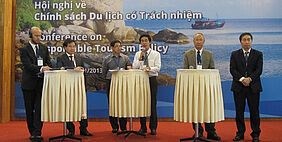Kai Partale presented the 6 pillars of the Responsible Tourism Policy Framework for Vietnam: 1. Creating a dynamic and efficient tourism sector, 2. Supporting competitiveness with sustainability, 3. Creating broad-based socio-economic development, 4. Expanding knowledge and understanding, 5. Investing in human capital / resources, and 6. Conservation and enhancement of natural and cultural resources.
Questions which have been addressed during the conference such as ‘how to incorporate sustainability into tourism policies and plans?’, ‘which policy areas create an enabling environment for businesses and the tourism industry as a whole?’ or ‘what are key instruments and actions resulting from a Responsible Tourism policy?’ were aimed to receiving contributions for the policy development and to encourage Government of Vietnam and tourism stakeholder to adopt the concept of a Responsible Tourism Policy, which will help create a competitive advantage necessary for Vietnam’s tourism sector to mature and flourish and continue to contribute to broad-based socio-economic development well into the future.
The intense debate in the working groups on several “hot topics” proved that the collaborative approach undertaken, policy development in conjunction with the tourism industry, as well as an emphasis on regional or local level decision-making was necessary to build the policy development process on a solid foundation. This should now result in stronger public-private partnerships and greater horizontal and vertical co-ordination of relevant government authorities as well as mechanisms which need to be established to guarantee a continuing dialogue on co-operation and policy debate, while building on a well-coordinated industry representation.
